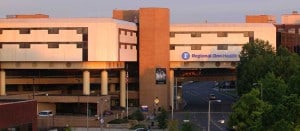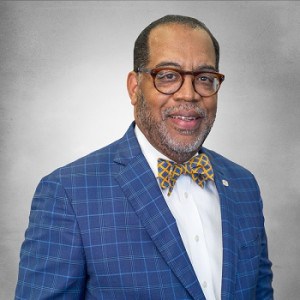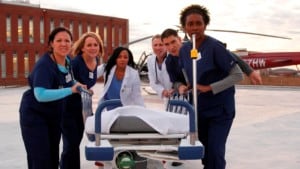The Daily Memphian describes how the ONE Campus initiative could make Regional One Health the region’s first academic medical center in partnership with University of Tennessee Health Science Center.
ONE Campus aims to replace Regional One Health’s outdated buildings with a state-of-the-art hospital in the heart of the Memphis Medical District.
It would position the health care system as a leader in attracting top medical talent, growing research opportunities, and offering new therapies, specialized surgeries and access to clinical trials.
This report originally appeared in The Daily Memphian
By Aisling Mäki, The Daily Memphian
Plans to rebuild Regional One Health and turn it into an academic medical center through a partnership with the University of Tennessee Health Science Center will become clearer on June 5.
That’s when the Shelby County Commission will vote on the final budget. Revenue from a proposed wheel tax increase could finance the county’s funding for the project.

Regional One Health is the oldest hospital in the State of Tennessee. The ONE Campus initiative would replace aging facilities with a state-of-the art, expanded medical center.
Officials envision the new entity — the name UT Health is being floated — as a hub of innovation that would attract top medical talent, grow research opportunities and offer new therapies, specialized surgeries and access to clinical trials.
“If Regional One is to be a premier location for the delivery of health care in our community, then the best way to go about that is a permanent and enduring relationship with UTHSC,” said Shelby County Mayor Lee Harris.
“Our academic medical campus is UTHSC, and for it to live up to its mission of research and training the very best medical talent in the state and region, it needs a hospital,” Harris said. “So, it just makes sense to work on that as a longer-term objective.”
Contemporary care within ‘old bones’
Regional One Health has been planning a $750 million project to replace its outdated hospital in the heart of the Memphis Medical District with a contemporary facility.
“We’re providing great care within old bones,” said Dr. Reginald Coopwood, CEO of Regional One Health, which was established in 1829, making it the oldest health system in Tennessee.
The hospital’s Chandler Building, where patients access services like outpatient rehabilitation and interventional radiology, was built nearly 60 years ago.
The Rout Building Women’s Hospital, with patient rooms, labor and delivery and a newborn center, is 65 years old.

Regional One Health President and CEO Reginald Coopwood, MD says the hospital provides excellent care “within old bones,” but the time has come to update and expand its facilities.
And the hospital’s power plant is 80 years old.
Coopwood said the process of creating an academic medical center could start moving forward as early as July 2024.
“Our timeline is to have all the agreements made before the legislative session so it can be voted on in Nashville,” he said. “That would create the opportunity to be included in the governor’s supplemental budget for funding for this new entity. It would be county approval this July, state approval by next April or May, then going full steam ahead next July.”
But the Shelby County Commission must approve the county’s $350 million investment and agree on how it will be funded.
A vote on Harris’ proposal for a wheel-tax was delayed at the May 15 commission meeting.
“Once the county acts, we would then work with the state to create an academic health authority to where the state and the county will have co-ownership of the academic medical center with board representation from the university, the state and the county,” Coopwood said.
He said the state, having some ownership in the new entity through the University of Tennessee, could participate in building a new facility.
“The state has made no promises, but I’ve had encouraging conversations with (UTHSC Chancellor Dr. Peter Buckley), with the president of the university and with legislators, as well as the governor’s administration about what step two looks like,” Coopwood said.
Buckley said most of Regional One Health’s physicians are his faculty members. They work in a hospital that’s home to the region’s only level-one trauma center and includes centers of excellence in burn, high-risk obstetrics and neonatal intensive care.
“They give spectacular care and they have a fantastic, dedicated staff,” Buckley said. “You want the people that have trauma and are in crisis to have the best available care and the best facilities. The building doesn’t define the quality of care, but it’s hard to give the best care somewhere that’s not optimum and contemporary in its building status.”

ONE Campus would allow Regional One Health to be the Mid-South’s first academic medical center, a hub of research, innovation and patient care.
The hospital complex rebuild will happen in phases, and everything but Turner Tower — which houses the Firefighters Burn Center, Surgery Center, Extended Care Hospital, Wound Care and the Rehabilitation Hospital — will be torn down.
Step one to replacing the hospital is $350 million.
In September 2022, the Shelby County Commission approved a resolution to allocate $350 million in funding for the new medical center, which allowed Regional One Health to begin raising state and federal government funding along with private and philanthropic support.
Meanwhile, a Regional One Health Committee has been meeting since last October to lay the groundwork for the creation of an academic health authority that would involve the state through UTHSC, making the state a partner with the county in the hospital’s ownership.
“Regional One has been around in one iteration or another for the last two centuries,” Harris said. “We met for many months, from October to March, and delivered a plan to the commission about how to ensure Regional One is able to thrive and take care of this community for the foreseeable future.”
Among others, committee members include Coopwood; Dr. Kennard Brown, who retired this month as executive vice chancellor and COO at UTHSC; Shelby County Commissioner Henri Brooks; Shelby County chief administrative officer Harold Collins; Shelby County attorney Marlinee Iverson; and Jim Proctor, Regional One Health senior vice president and chief financial officer.
“Part of the plan is to try to use the county’s investment to unlock state resources, simply get the state to invest a comparable amount at Regional One and rebuild the campus,” Harris said.
Building on an existing foundation
Regional One Health is UTHSC’s largest medical and surgical teaching site. More than half of Tennessee’s doctors will receive some, if not all, training at the Memphis hospital.

Regional One Health is UTHSC’s largest medical and surgical teaching site. More than half of Tennessee’s doctors will receive some, if not all, training at the hospital.
The longstanding partnership between Regional One Health and UTHSC includes the UT Regional One Physicians group, the largest teaching physician group of its kind in the Mid-South.
“Although they’ve got a really great contractual relationship right now, we definitely want to see that continue and build on that,” Harris said.
Reimagining Regional One Health as the Mid-South’s first academic medical center would make that relationship permanent.
Coopwood arrived in Memphis in 2010 to take the helm of Regional One, then known as The Regional Medical Center at Memphis or The Med.
Shortly after his arrival, Coopwood met with UTHSC leadership to discuss the relationship between the two entities.
“We floated this idea of partnering with them to truly build an academic medical center,” he said. “It wasn’t the vision of the university at the time.”
“But over these past 13 years, Regional One has evolved as an organization, our relationship with the University of Tennessee has evolved and their leadership has evolved,” he said. “I’d say we now have likemindedness with the chancellor and the dean of the medical school to really do the hard work of building a true academic medical center where there has never been one.”
A Mid-South milestone
Nashville has Vanderbilt University Medical Center, which maintains academic affiliations with Vanderbilt University. Knoxville has UT Medical Center, whose residency and medical student education is overseen by the University of Tennessee Graduate School of Medicine.
Memphis could have UT Health, an academic medical center affiliated with UTHSC in the heart of the city.
“When you have a community of over a million people and you have a medical school, you really should have an academic medical center that’s leading the way in technology, attracting top talent, and leveraging that talent to provide therapies that either develop at UTHSC or we share them through a network of academic medical centers to benefit the health of the community,” Coopwood said.

ONE Campus will help Regional One Health recruit top medical talent to fulfill its research, patient care, and educational missions.
The community could benefit from UT Health’s presence.
A recent study led by researcher-clinicians at Beth Israel Deaconess Medical Center in Boston suggests the presence of academic medical centers within a health care market is linked to better outcomes for patients treated at nearby community hospitals.
The findings show receiving care at a community hospital in a market with an academic medical center presence was associated with lower mortality and a greater number of healthy days at home.
Buckley said academic medical centers are magnets for recruiting specialists to communities.
“If you have a specialization in that area, and you’ve got the resources and you’ve got the patient population, that’s exactly what that clinician wants,” he said.
Buckley said academic medical centers serve as nuclei of innovation, which benefits patients with complex medical issues who can access clinical trials.
Meanwhile, Regional One Health is seeking to become an NCI-designated cancer center.
According to the National Cancer Institute, centers with this designation are recognized for their scientific leadership in laboratory and clinical research.
They serve communities and the broader public by integrating training and education for biomedical researchers and health care professionals.
“Most large cities that have academic medical centers have an affiliated cancer center,” Coopwood said. “So, once you receive that designation, you can participate in large trials for cancer treatments that aren’t necessarily available in the community.
“Some people will travel to Houston or another city in order to participate in these trials,” he said. “To be able to bring that to the adult cancer population here would be huge.”

Regional One Health’s Elvis Presley Trauma Center is the only level-one trauma center in a 150-mile radius. ONE Campus would expand this crucial service to care for critically injured patients from all over the Mid-South.
Creating an academic medical center is a years-long process that requires a tremendous amount of expertise.
On May 1, Buckley brought Paul Wesolowski to UTHSC to fill a newly created position: vice chancellor for strategic partnerships.
“I’m really excited about having him as we think about Regional One because here’s somebody that’s come from a hospital that’s an academic medical center,” Buckley said of Wesolowski, his former colleague at Virginia Commonwealth University.
Wesolowski will work to strengthen and expand UTHSC’s clinical, educational and strategic partnerships across the state.
And he has his work cut out for him with 880 clinical or educational training sites statewide.
“I’m excited about all 880, and I’m excited about Regional One,” Buckley said. “We are interested and excited about continuing to evolve this partnership, but in the context of the overall ecosystem where we have the privilege and the opportunity to have many partners.”
Buckley said a permanent Regional One Health partnership will not weaken UTHSC’s existing partnerships with other hospitals, which include Methodist Le Bonheur Healthcare, Memphis VA Medical Center and Baptist Memorial.
“We’re not focusing on one area to the exclusion of another,” Buckley said. “These partnerships provide an experience and a variety and a richness, and they enable us to interdigitate with many groups.”
About the writer
Aisling Mäki has spent the better part of two decades writing about Memphis. A former digital journalist for WMC Action News 5 and staff reporter for Memphis Daily News, her work has also appeared in The Commercial Appeal, High Ground News, I Love Memphis, Inside Memphis Business, The Memphis Flyer, Memphis Parent, Memphis Magazine and Tri-State Defender.
[/fusion_text][/fusion_builder_column][/fusion_builder_row][/fusion_builder_container]